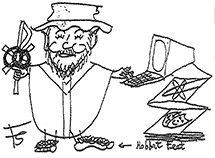Almost any talk of science and faith reveals that many people believe that these two ways of looking at reality are in conflict.
This was not so in the days of the great philosopher René Descartes, or the great scientist, Isaac Newton. They believed that God was in control of the world which they were examining with the scientific means at their disposal.
The conflict really started earlier with Galileo, who believed that astronomy and physics belonged to a way of thought which would eventually explain everything, everywhere. This mistake is continued today in “scientism” - the “ism” based on speculation about the implications of science, treating science as the only disciipline of human intelligence.
After Newton a philosophical movement called the “Enlightenment” began the rejection of God’s “control”: many thinkers in Europe began to believe what Galileo did, who had barely found enough wiggle room to get away with his views under the inquisitive eye of the Church.
For a long time Church thinkers assumed that biblical stories about the Creation and the early history of the world were historical and rational explanations of what had actually happened. When Charles Darwin published his Origin of Species by Natural Selection in 1859 his theory of evolution conflicted with the assumption by Christian believers that the Bible was a scientific account of reality. Thinking Church members were already meeting the issues of literalism and intellectual change in a book called Essays and Reviews, (1860),which in its time had a far greater circulation than Darwin’s book.
Today the conflict continues in some very public ways: for example,people fight over the use or non-use of religious symbols and holidays etc. in public schools. The Psalms of David put it in a beautiful phrase:
Why do the nations so furiously rage together, and why do the people imagine a vain thing? (Psalm 2)
If we try to look at each side of the question, one thing is apparent: anti-evolution believers want certainty, and they think the only certainty comes from a Bible dictated by God and with statements that cannot be changed, or even interpreted. Scientists also want certainty, the risky certainty that comes from the process of Preparation (scrabbling around) Incubation (taking a rest) Illumination (popping up) and Verification (checking up) (A sequence observed in human creativity by the mathematician Henri Poincaré and further developed by the philosopher-scientist Michael Polanyi)
Such a process is subject to change, when new observations or new inspiration require it.
Good scientists are not afraid of change, when the evidence requires it.
The same should be said of believers, not only because the same mental process which is used science is used also in the development of faith. An even more important reason why a person of faith should accept change is that if nothing is left to chance, then having faith is pretty feeble. Faith is at its best when challenged by doubt.
A friend of mine who is an atheist (born that way!) found herself the object of slighting remarks at a Christian baptism when references were made to atheism being the evil work of the devil, trying to infiltrate the family! If we believe God gives us free choice, then who dares say that some may choose not to believe?
David Bartholomew was Professor of Statistical and Mathematical Science at the London School of Economics when in 1984 he published his book, God of Chance. A Christian believer, he wrote:
“Instead of opposing God and chance, we shall contend that chance was God’s idea and that he uses it to ensure the variety, resilience and freedom necessary to achieve his purposes.” (SCM Press, 1984, page 14).
An Anglican prayer reads, in part: “that among all the sundry and manifold changes of the world, our hearts may surely there be fixed, where true joys are to be found.” And in another prayer we ask that God will help us “among all the changes and chances of this mortal life.” Change and chance are part of God’s gift in creating.
These prayers assume that changes and chances are part of the natural order, and that with God’s help we can live within this world of change.
Ash Wednesday
When you receive this letter you may be about to recover from an overdose of carbohydrates (Pancake Supper) followed by being precipitated into a call to repentance and witness to God’s Big Change ( Life/Death/Life) “Remember you are dust, and to dust you will return”
Stardust? Our changes and chances are bittersweet: bitter, then sweet.

